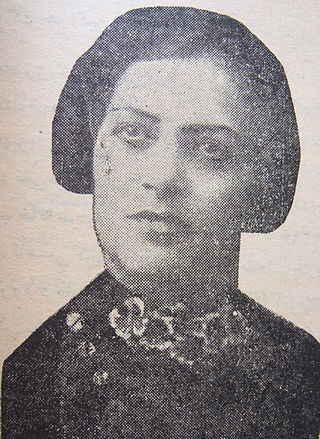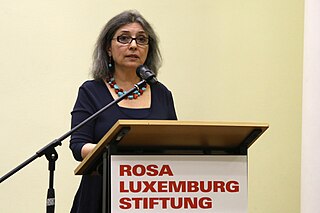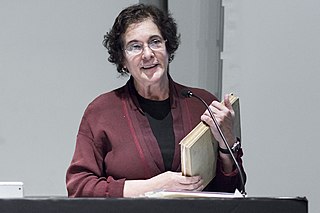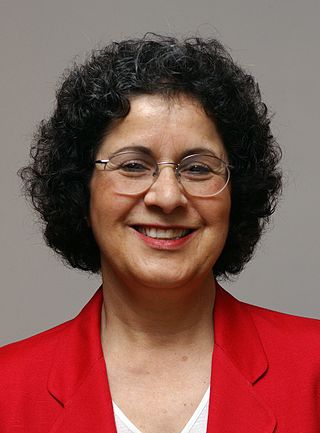Related Research Articles
Lois Wendland Banner is an American author and emeritus professor of history at the University of Southern California. She is one of the earliest academics to focus on women's history in the United States. Her work includes biographies of Margaret Mead, Ruth Benedict, Marilyn Monroe and Greta Garbo as well as the textbook Women in Modern America: A Brief History.

Haleh Afshar, Baroness Afshar, was a British life peer in the House of Lords. She had a life-long interest in women's rights and Islamic law. She was a professor at the University of York and she wrote over a dozen scholarly books.
Janet Afary is an author, feminist activist and researcher of history, religious studies and women studies. She is a professor and the Mellichamp Chair in Global Religion and Modernity at the University of California, Santa Barbara (UCSB).
Mohammad Hashem Pesaran is a British–Iranian economist.

Sediqeh Dowlatabadi was an Iranian feminist activist and journalist and one of the pioneering figures in the Persian women's movement.
Saba Mahmood (1961–2018) was professor of anthropology at the University of California, Berkeley. At Berkeley, she was also affiliated with the Center for Middle Eastern Studies, Institute for South Asia Studies, and the Program in Critical Theory. Her scholarly work straddled debates in anthropology and political theory, with a focus on Muslim majority societies of the Middle East and South Asia. Mahmood made major theoretical contributions to rethinking the relationship between ethics and politics, religion and secularism, freedom and submission, and reason and embodiment. Influenced by the work of Talal Asad, she wrote on issues of gender, religious politics, secularism, and Muslim and non-Muslim relations in the Middle East.

Shahrzad Mojab is an academic activist and professor, teaching at the Department of Leadership, Higher and Adult Education and Women and Gender Studies Institute, at the University of Toronto. Shahrzad has been living in Canada since 1986 with her lifelong partner, colleague and comrade, Amir Hassanpour, and their son, Salah.

Lila Abu-Lughod is an American anthropologist. She is the Joseph L. Buttenweiser Professor of Social Science in the Department of Anthropology at Columbia University in New York City. She specializes in ethnographic research in the Arab world, and her seven books cover topics including sentiment and poetry, nationalism and media, gender politics and the politics of memory.

The Iranian Women's Rights Movement, is the social movement for women's rights of the women in Iran. The movement first emerged after the Iranian Constitutional Revolution in 1910, the year in which the first women's periodical was published by women. The movement lasted until 1933 when the last women's association was dissolved by the government of Reza Shah Pahlavi. It rose again after the Iranian Revolution in 1979.

Smadar Lavie is a professor emerita of anthropology at the University of California Davis, and a Mizrahi anthropologist, author, and activist. She specializes in the anthropology of Egypt, Israel and Palestine, emphasizing issues of race, gender and religion. She received her doctorate in anthropology from the University of California at Berkeley (1989).
Nayereh Esfahlani Tohidi is an Iranian-born American professor, researcher, and academic administrator. Tohidi is a professor emerita and former chair of gender and women’s studies, and the founding director of the Middle Eastern and Islamic studies at California State University, Northridge.

Suad Joseph received her doctorate in Anthropology from Columbia University in 1975. Dr. Joseph is Professor of Anthropology and Women and Gender Studies at the University of California, Davis and in 2009 was President of the Middle East Studies Association of North America. Her research addresses issues of gender; families, children, and youth; sociology of the family; and selfhood, citizenship, and the state in the Middle East, with a focus on her native Lebanon. Her earlier work focused on the politicization of religion in Lebanon. Joseph is the founder of the Middle East Research Group in Anthropology, the founder and coordinator of the Arab Families Working Group, the founder of the Association for Middle East Women's Studies, the general editor of the Encyclopedia of Women and Islamic Cultures, and the founding director of the Middle East/South Asian Studies Program at the University of California at Davis. She is also the founder and facilitator of a six-university consortium of the American University of Beirut, American University in Cairo, Lebanese American University, University of California at Davis, and Birzeit University Consortium.
Mounira Maya Charrad is a Franco-Tunisian sociologist who serves as associate professor of sociology at the University of Texas at Austin.
Middle Eastern Americans are Americans of Middle Eastern background. Although once considered Asian Americans, the modern definition of "Asian American" now excludes people with West Asian backgrounds.
Pardis Mahdavi is an American scholar and former president of University of La Verne. Previously, she was the provost and executive vice president of the University of Montana, the dean of social sciences at Arizona State University, acting dean of Josef Korbel School of International Studies at the University of Denver, and the dean of women and chair of anthropology at Pomona College.
The Iranian women participated actively in constitutional struggles. From the year 1906 women's organizations were formed and many women participated in constitutionalism. But the National Women's Movement was just a minority movement and part of the great national movement of Iran with the goal of the independence of the country and the implementation of the constitution. The participation of women in these political events was spontaneous, with their new nationalist sentiment and willingness to be recognized.
Mokhadarat Vatan Association was a feminist society that was formed in 1910 during the Iranian Constitutional Revolution and the national movements happening in the 1900s. The aim of this association was to organize various activities for Iranian independence from the sovereignty of foreign countries. The members of the association were active in the meetings and demonstrations of the constitutional movement. They also wrote protest letters to the Russian Government about their imperialist actions.
The Great Islamic Coalition or the Coalition of Islamic Parties was an electoral alliance of organizations led by Islamic Republican Party, competing in 1979 Iranian Constitutional Convention election. It was the largest coalition in the elections, and used its influence on media, Islamic Revolution Committees and the mosques to oust their opponents, most importantly the Quintuple Coalition of radical Islamic groups.
Christian Robert Grose is an American political scientist. He is a professor of political science and public policy at the University of Southern California, academic director of the USC Schwarzenegger Institute for State and Global Policy, and served as director of the Political Science and International Relations PhD Program from 2015 to 2018. He studies behavioral elite decision making in politics, racial and ethnic politics, public policy, voting rights, political representation, and legislative politics.
References
- ↑ "Eliz Sanasarian". University of Southern California Dornsife - Center for Religion and Civic Culture. 2014-10-28. Archived from the original on October 28, 2014. Retrieved 2015-10-25.